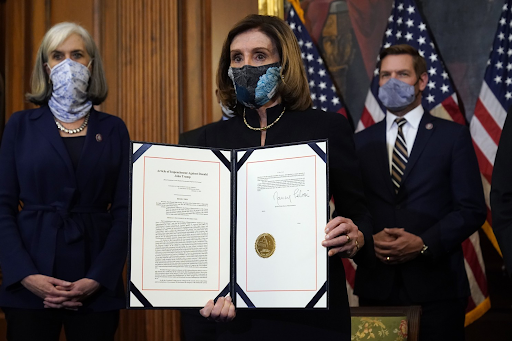
On January 13, the House of Representatives charged former President Donald Trump with “incitement of insurrection” after igniting the Capitol riots. Rightfully so, Trump became the first president in American history to be impeached for the second time. Ten Republicans in the House voted to impeach Trump, setting the record for the greatest number of representatives to vote against a member of their own party. Following the impeachment, a conviction from the Senate is required to remove the president from office, or in this case to prevent him from holding office in the future.
To achieve a successful conviction, seventeen Republican senators are required to vote against Trump. With the expiration of Donald Trump’s presidency, the process is likely to continue into Biden’s term, even though there are countless Republican congressmen opposing the cogency of the upcoming Senate trials. Whether or not the Constitution allows Trump to be tried in the Senate post-presidency is still in question.
The purpose of a Senate conviction is to remove the sitting president from office. However, if Trump is no longer the President, is a trial even called for? The Constitution is up for interpretation, therefore there is no clear law ruling out a trial and conviction after the presidency, especially because the President has already been impeached and a trial must follow. In such cases, the Senate has the ability to determine what the Constitution refers to, and whether it applies to the present situation.
Even if it is possible, why should President Trump be impeached and convicted if he is no longer in office?
A successful conviction would allow the Senate to participate in an additional vote that impedes Trump from the presidency in the future. According to Article 1 Section 3 of the Constitution, it vaguely states that, “judgment in Cases of Impeachment shall not extend further than to removal from Office, and disqualification to hold and enjoy any Office of honor, Trust or Profit under the United States: but the Party convicted shall nevertheless be liable and subject to Indictment, Trial, Judgment and Punishment, according to Law.” This means that no matter the circumstance of the impeachment, the President must receive a punishment if the conviction is successful.
Oftentimes, the impeachment is referred to as a removal from office, bringing into question whether it is worth the trouble to impeach, convict, and bar a president from running for any office of honor. If an impeached president is not prevented from running again, who’s to say they would not make the same mistakes when upholding another federal role? However, the Constitution highlights that a president can be removed from office on “impeachment for, and Conviction of, Treason, Bribery, or other high Crimes and Misdemeanors.” Trump was impeached for abuse of power and obstruction of Congress, making Trump’s conviction and presumptuous disqualification from office essential. By failing to do so, the Senate would not be performing their civic duties established by the Constitution.
The president’s role is to represent, lead, and set an example for the American people. As the head of the government, it is the president’s responsibility to protect the people. Trump failed to fulfill this role and should be held accountable for his reckless actions. On January 6th, Trump carried out a speech at his rally which many saw as encouraging supporters to storm the Capitol during the certification of the electoral college results. The armed pro-Trump mob entered the Capitol with Congress in session, endangering numerous legislatures and attempting to obstruct democracy. Trump conveyed the message that violence and intimidation was necessary to overturn the election through the words “fight much harder,” “show strength,” “we will not take it anymore, and that is what this is all about,” “we will stop the steal” and, “if you don’t fight like hell, you’re not going to have a country anymore.”
Former President Trump said some very provocative words at his rally, and the President’s words hold value to the people and the nation as a whole. The President’s words are trusted, remembered, and should be consciously crafted, otherwise they reap consequences. Donald Trump has a reputation for spreading false information and delivering controversial statements. In this case, his words fueled a vicious mob to attack the U.S. Capitol. The Capitol riots were an embarrassment to the country and will forever be remembered as a great failure of America’s government and national security. Woodrow Wilson once said, “Nothing short of the grossest offenses against the plain law of the land will suffice to give them speed and effectiveness. Indignation so great as to overgrow party interest may secure a conviction; but nothing else can.” Trump’s actions most certainly “overgrow party interest” and should “secure a conviction.”
Holding the guilty accountable is a prospect America has always struggled with and continues to struggle with today. As Alexander Hamilton once said, “No one need be afraid that officers who commit oppression will pass with immunity.” Therefore, allowing Donald Trump to conclude his presidency without a form of indictment would be an injustice to the American people. Holding the President accountable is important to maintain domestic tranquility and set a precedent for future presidents, effectively preventing a tyrannical term.
Sources:
https://www.npr.org/2021/01/18/957866252/can-the-senate-try-an-ex-president
https://www.nytimes.com/article/why-impeach-remove-trump-now.html
https://www.senate.gov/artandhistory/history/common/briefing/Senate_Impeachment_Role.htm
https://www.constituteproject.org/constitution/United_States_of_America_1992
https://www.nytimes.com/2021/01/10/us/trump-speech-riot.html






























